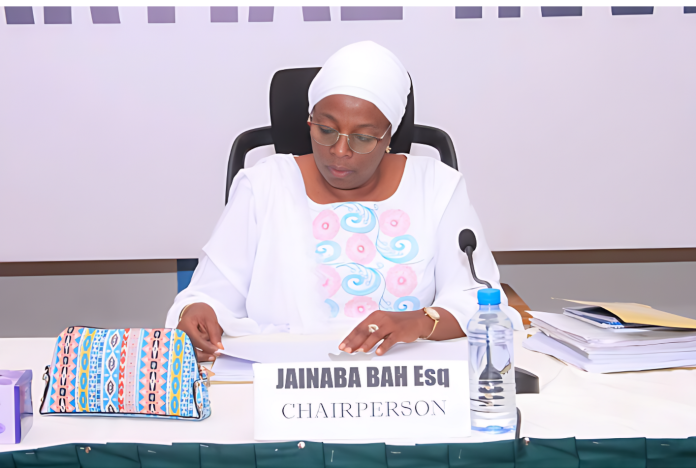A former finance manager of the CityLink Ostend-Banjul project told the Local Government Commission of Inquiry on Thursday that he was made a signatory to the project’s bank accounts after the Director of Finance at the Banjul City Council (BCC) refused to sign off on cheques due to procurement and budgetary concerns.
Muhammed Cham, who served as finance manager for the EU-funded project from October 25, 2021, until December 2024, is currently on administrative leave. In his testimony before the Commission, Cham confirmed that he became a signatory to the project’s BSIC and Eco Bank accounts following a standoff between the project leadership and the then Director of Finance, Momodou Camara.
According to Cham, Camara was originally the designated signatory for the Council but stopped signing cheques for the CityLink project. When asked by Lead Counsel Patrick Gomez whether he had ever asked Camara why he refused to sign, Cham said he had not. “He was my boss,” he stated, “but I didn’t ask him why he wasn’t signing.”
Gomez challenged Cham’s failure to question the irregularity of the arrangement, suggesting that he had simply stepped in to do a job his superior refused to do. “You came in as number two,” Gomez said. “You did not question, even for once, why you should be signing cheques when the director of finance was present.” Cham agreed saying the director of finance was there.
Camara, acting in his capacity as Director of Finance, declined to endorse certain payments which, according to Cham, caused delays in project disbursements. As a result, the project leadership — including the project manager and EU project coordinator — made the decision to add Cham as an alternative signatory. “The project cannot be at a standstill,” Cham said, noting that this was the rationale given to him at the time.
Two letters from the CityLink Ostend-Banjul Project to BSIC and Eco Bank, authorizing Cham as a signatory, were admitted as exhibits. Cham maintained that the move was necessary to keep the project functional but acknowledged that the arrangement was outside standard financial protocol.
“You were added to be relevant and to be signing cheques,” Gomez told him. “That may be the case,” Cham responded, not disputing the assertion.
Gomez further accused Cham of being a rubber-stamp signatory, used by project officials to bypass proper oversight. “You were brought in because you were easier than Camara,” Gomez said. “You allowed all payments to pass.”
“There is no payment brought to me that I said I won’t sign,” Cham admitted, adding that most payments were, in his view, for official purposes.
The Commission questioned Cham’s judgment in continuing to approve payments after his superior had withheld his signature as a protest. Gomez stressed that Cham’s role as a subordinate did not give him the authority to override or replace the Director of Finance. Cham conceded that Camara should have remained the primary signatory. “I was just brought in to sign if Camara was not available,” Cham said.
“But Camara was available,” Gomez countered. “He just refused to sign.”
Cham did not dispute this. Instead, he said the project team wanted to ensure continuity of operations and avoid financial bottlenecks. “There was a fallout,” Cham explained, “and I was made a signatory.”
According to Cham, the disagreements extended to specific transactions. One such example was a D1 million budget proposed from the Office of the Mayor for a Town Hall meeting, which the finance director opposed, claiming it was not part of the approved budget. Cham said the team attempted to reduce the cost to D900,000 and reclassify the expense under the project’s Visibility Budget line, but Camara still refused to sign the cheque. Cham said the disagreement led to Camara’s removal from the project’s Steering Committee.
The Commission also learned that Cham continued to serve as a signatory even while Camara remained formally listed as a co-signatory. Gomez argued this violated standard procedure and effectively sidelined the finance director.
In response to questions about his role in overseeing procurement and cash disbursements, Cham said the BCC sometimes failed to follow procurement procedures. He acknowledged that while most transactions followed the correct process, “not all” did. He admitted that petty cash and impress ledgers were not consistently maintained, though he said records of impress retirements could be found in a digital bookkeeping system he referred to as “DBE.” He has been asked to present those records next week.
Gomez read out several provisions from the Financial Manual for Local Government Councils, pointing out that Cham’s approval of payments without proper documentation or oversight contravened established regulations. Cham did not contest the reading and admitted the guidelines were not always followed.
At one point, Gomez alleged that contractors and vendors who worked with the project admitted under oath that they received payments without contracts. “You helped them get their cheques signed,” Gomez said. Cham remained silent and did not deny the claim.
The Commission’s proceedings form part of a broader inquiry into the financial and administrative activities of local government councils between May 2018 and January 2023. The probe, launched to enhance transparency and accountability in public administration, has so far uncovered numerous instances of procedural lapses, unauthorized payments, and apparent internal power struggles.
Cham is expected to return to the Commission next week to submit additional documentation, including impress retirements, procurement records, and supporting vouchers related to project spending.


















